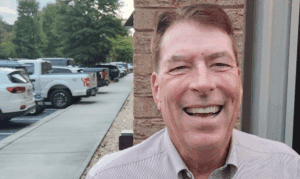Eleven weeks have passed since I began my journey into a Clinical Pastoral Education unit. Most clergy who enroll in CPE do so in seminary or soon after. Since I don’t seem to do anything in the normal way, I enrolled at the age of 64.
Each unit is 20 weeks long and involves about 4-5 hours in class each week, 15 hours on the floor of a hospital, and 5-10 hours a week in reading and writing.
How do I do that and still do all I do? Don’t ask. It does get done and I am wishing I had done this in my 20s.
I have served some 44 years in various forms of ministry, including: youth worker, minister of youth, minister of outreach, minister of education, associate pastor, senior pastor, missions pastor, chaplain (law enforcement, hospice, veteran’s, etc.), bishop, and more.
In those various roles I have learned that sadness sometimes comes to people, tragedy comes occasionally, and catastrophe occurs infrequently. In hospital or hospice ministry, I have learned that all three occur every single day somewhere in the facility.
No one, if they are a patient, is happy about being in the hospital unless the occasion is the birth of a child, and those events can also turn sadly, tragically, catastrophic.
The hospital is surely a place of birth, of healing, of recovery, of strengthening; but it is also, at the same time, a place of sadness, pain, disease, trauma, and death.
The ministry of a pastor is often public, especially on Sundays. There is also the public sharing in baptism, weddings, and funerals. The chaplain’s work is often hidden as s/he goes from room to room, from patient to patient, praying in private (if permitted by the patient), baptizing with few witnesses, consoling, counseling, listening, absolving — all behind closed doors or privacy screens.
Without public recognition or acclaim, they minister one-to-one to people in great distress who will soon be gone from the hospital. These patients will fade into the community, never giving a thought to sending a note of thanks or a seasonal card at Christmas.
In some ways, hospital chaplains are akin to those soldiers who stand lonely watch in faraway places so that the greater community will benefit.
Who knows about the soldier who stands watch along the DMZ between North Korea and South Korea? Who is aware of those sailors who sail on ships near ice covered lands? Who is mindful of those marines on guard in Cuba or those airmen doing their duty in a no-name base in the Middle East? Who thinks about the coast guardsman who prowls southern waters doing drug interdiction or braves the icy Bering Sea to rescue fishermen? Yet, they are vital to the cause — to the security of the nation.
So, too, are those chaplains who are seen by the ill, the infirm, the aged, the diseased, and the dying. They, too, are vital to the cause, even if patients, family members, and even staff members are unaware or unappreciative of their efforts.
What they do, they do not for recognition but because there is a task, a ministry, that needs to be done and no one else in the hospital is capable of doing exactly what they do. They are not medical people and, in the hospital setting, are neither fish nor fowl — they are not pastors and they are not medical. They are chaplains. What they do have the ability to do, and the time to do it, is listen.
They listen to the concerns, the fears, the anguish, the confusion, the anger, the expressions of faith, the lack of the same, and the complaints of any who want to vent. They are present for patients and staff alike.
Although they have a denominational affiliation, in the hospital, or the hospice, they are not Baptist, Methodist, Presbyterian, Catholic, Episcopalian, Anglican, Pentecostal, nor do they wear any other label. They are chaplains.
They are available to Christians, Muslims, Jews, or any other faith group. They are they for those who love God and for those who hate God. They are even there for those who deny that there is a God.
They are there when people come into the emergency room, when they are in ICU, when they are in rooms on the various units, and they are there when people “code,” and they are there when people die.
It is not an easy ministry and it can take a toll. Some chaplains are paid, most are not.
If you are ever in the hospital and a person sticks his or her head in the room and says, “Hi, I’m one of the chaplains here at the hospital.” If you wonder what they are there for, here’s the answer: they are there for you.
[David Epps is the pastor of the Cathedral of Christ the King, Sharpsburg, GA (www.ctkcec.org). He is the bishop of the Mid-South Diocese which consists of Georgia and Tennessee (www.midsouthdiocese.org) and the Associate Endorser for the Department of the Armed Forces, U. S. Military Chaplains, ICCEC. He may contacted at [email protected].]












Leave a Comment
You must be logged in to post a comment.